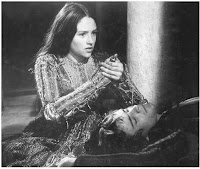

As if the fear of teaching a class full of teenagers wouldn’t frighten any new teacher, I have an additional fear of teaching the great, the untouchable, The Bard, William Shakespeare. Looking through the list of novels and plays that must be taught in high school reaffirmed a fear I thought has long since subsided. Throughout my high school years I was fraught with English teachers that would drive Shakespeare’s works into my head with all their might, never once attempting to ease it in, or ask if I would like another bite of what they were serving. They forced "Romeo & Juliet" in between my lips, whether I wanted it “to be or not to be.” They drowned me in scenes from the "Merchant of Venice," but never gave me the satisfaction of a death scene, like the one afforded to Macbeth or Hamlet. I definitely had issues with Shakespeare. My term paper for my senior year was a amateurish attempt to depose the author of his works and poems associated with his name. I delved into books on the topic. Was Shakespeare the true author of the plays, stories and sonnets which bore his name? I had an agenda and was attempting in vain to confirm the rumor through my research. I loathed the greatest author in history. Why did I dislike Shakespeare so much, and how could I change this outcome in my future students?
To say that I have reminisced on those lessons in Shakespeare and have failed to learn from it would be incorrect. Those teachers were not attempting to torture me and other students with Shakespeare, but they failed to give us the tools we needed to succeed. They were simply mimicking what they had seen their teachers do when they were in high school. This is why I fear to teach Shakespeare in my class of the future. I’m afraid I don’t have the tools needed to get them to truly appreciate the great literature. I want to find methods that will break down this barrier in teaching William Shakespeare’s works, especially "Romeo and Juliet." It is one of the required readings for freshman students, and as a new teacher, this might be the likely choice of grade level that I will be given.
I know that my experience with teaching Shakespeare will be a very different one, due to the era of my class and information sharing through the internet. The widespread use of the internet and the ability to access resources on both Shakespeare and teaching the author will prove to be vital in the success of my class. I know there are books out that will help my students who are having difficulty with the language, called “No Fear Shakespeare.” I believe these will be priceless to students who encounter difficulty getting past the language. I imagine that there are hundreds, if not thousands, of lesson plans for teaching Shakespeare that will both alleviate my fears and fortify my lesson plans with creative ways of presenting the materials. I know that with the additional resources provided by organizations, both in print and on the internet, teachers today have a better chance at presenting lessons that all students will find interesting.